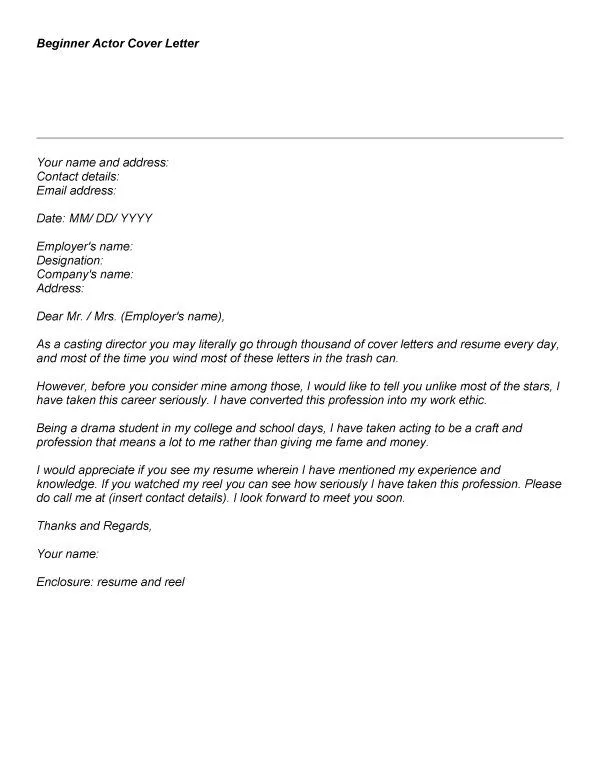What is An Acting Agent?
An acting agent is a professional who represents actors and helps them find work in the entertainment industry. They act as a bridge between actors and casting directors, producers, and other industry professionals. Agents negotiate contracts, submit actors for auditions, and provide career guidance. They are essential for actors looking to build a successful career, as they have the connections and expertise to navigate the complex world of acting.
Why Do You Need An Acting Agent?
Securing an acting agent is crucial for several reasons. Firstly, agents have access to casting calls and opportunities that are often unavailable to unrepresented actors. They actively seek out roles that match their clients’ skills and experience, increasing the chances of securing auditions. Secondly, agents handle the often-complex negotiations of contracts, ensuring actors receive fair compensation and favorable terms. Finally, agents offer invaluable career advice, helping actors make informed decisions about their careers and navigate the challenges of the industry. Agents are the foundation in the acting industry, an actor cannot succeed without them.
Key Components of a Great Cover Letter
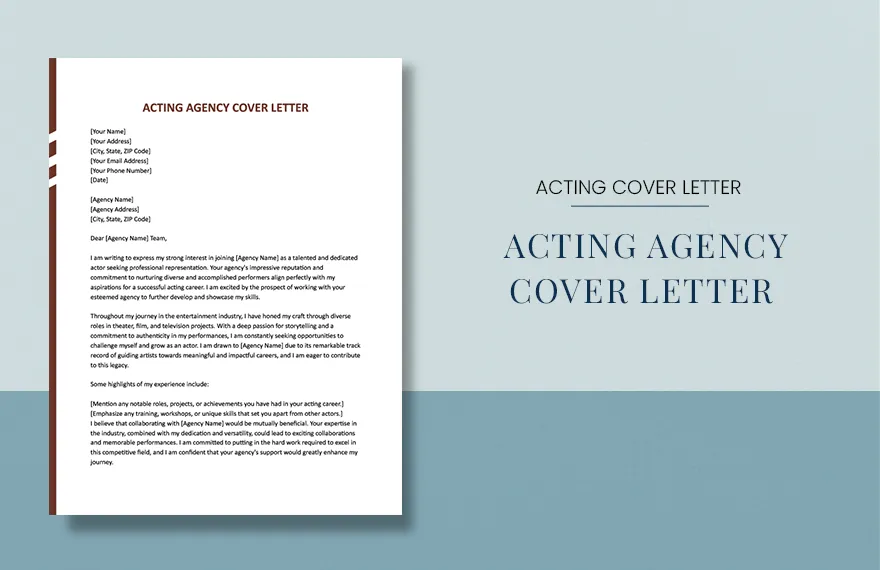
A well-crafted cover letter is your first impression on an acting agent. It’s your opportunity to showcase your professionalism, experience, and potential. To make a lasting impact, your cover letter must be concise, compelling, and tailored to the specific agent or agency. Highlight your unique qualities, experience, and demonstrate your understanding of the agent’s work. Ensure your cover letter is error-free, easy to read, and well-formatted. A strong cover letter can significantly increase your chances of securing representation and launching your acting career.
Header
The header of your cover letter should be professional and easy to read. It should include your full name and contact information. Make sure to use a font that is clear and simple to read. It is important to use a professional font like Times New Roman or Arial, 12-point font. Always ensure that your name is the most prominent element in the header and is easy to distinguish from the rest of the information. Use a professional-looking layout that is consistent with the overall tone of your cover letter.
Your Contact Information
Your contact information should include your full name, phone number, and email address. Make sure the phone number is one where you can be easily reached and your email is professional. It is recommended to create an email address specifically for your acting career. Ensure your email address sounds professional and is easy to remember. Keep your contact information consistent across all your professional materials, including your resume and headshot. Your contact information should be placed at the top of the letter, either aligned to the left or right, depending on the overall layout.
Agent’s Contact Information
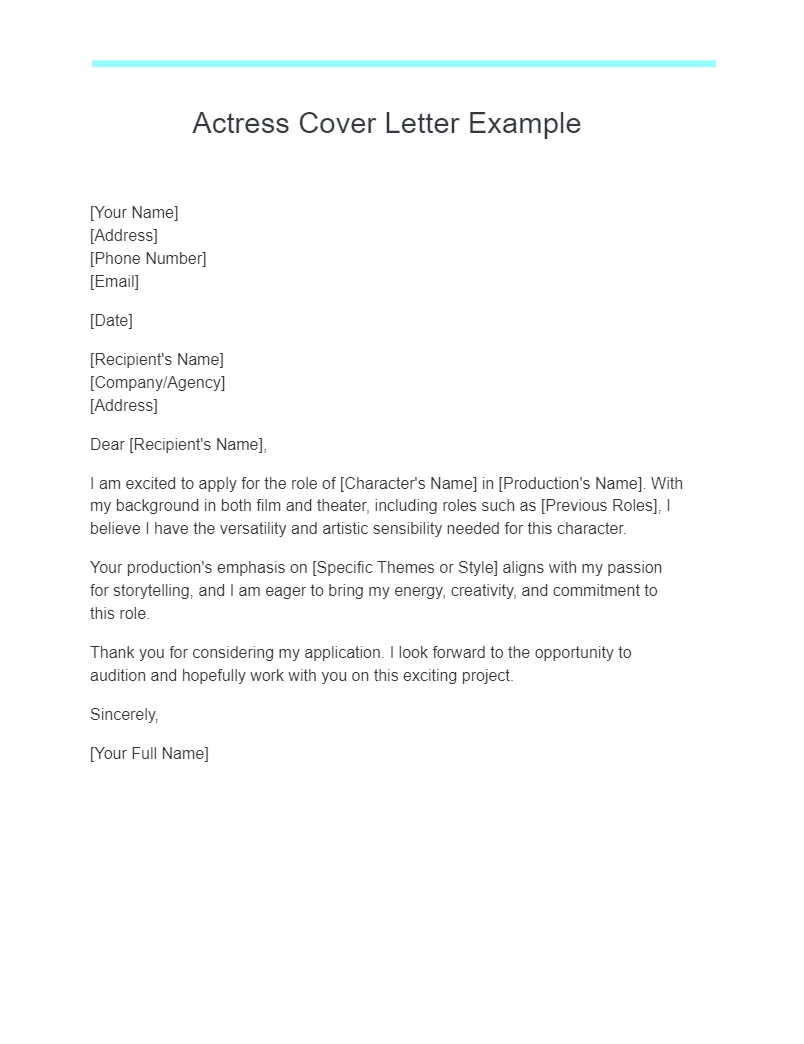
Include the agent’s full name, agency name, and address. If you know the specific agent you are addressing, use their name in the greeting. If not, you can address the letter to the agency itself. Ensure the agent’s name and agency details are accurate. Research the agency and find the correct contact person, if possible. Confirm the agency’s mailing address to avoid delays. Use a professional format that is standard for business correspondence. This demonstrates your attention to detail and professionalism, showing you have taken the time to research and tailor your letter.
Greeting the Agent
Use a professional greeting, such as “Dear Mr./Ms. [Last Name]” or “Dear [Agent Name]” if you know the agent’s name. Always address the agent appropriately and avoid informal greetings. When addressing the letter to an agency, use “Dear [Agency Name]” or “To Whom It May Concern” if you cannot find a specific name. Always spell the agent’s name correctly. This shows respect and attention to detail. Keep the greeting concise and professional. Avoid overused or overly familiar greetings.
Personalized Introduction
Start with a strong, personalized introduction. Mention how you discovered the agent or agency and express your interest in their work. Show that you have researched the agent and understand their client roster. Briefly state your career goals and what you hope to achieve with representation. Tailor your introduction to the specific agent, highlighting aspects of their work that resonate with you. This demonstrates your genuine interest and initiative. Your introduction should be enthusiastic and professional. Avoid generic opening lines and make it clear why you are contacting them.
Highlighting Your Experience & Training
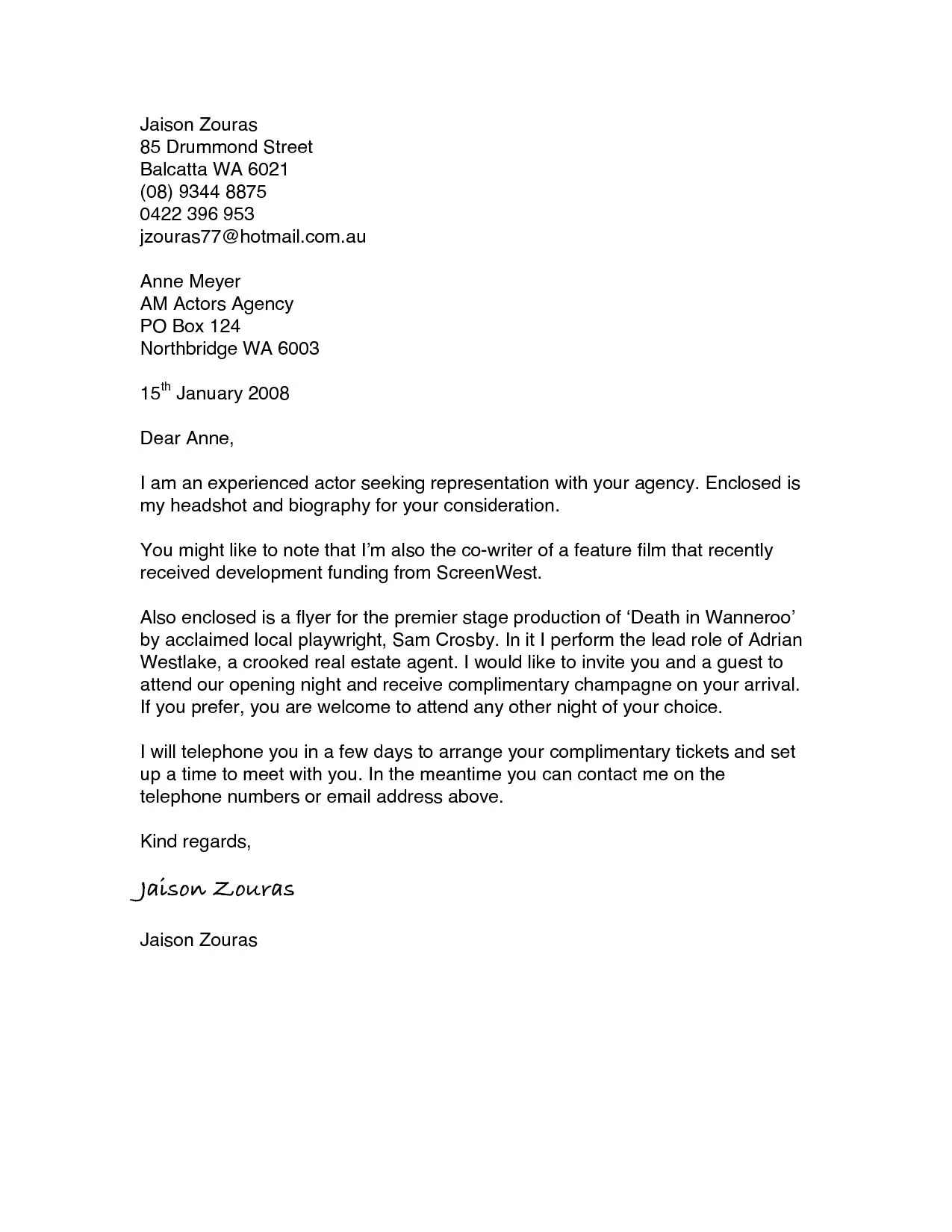
Provide a concise overview of your acting experience and training. Include relevant credits, such as film, television, and stage roles. Mention any notable training you have received, such as acting classes, workshops, or coaching. Tailor this section to match the agent’s focus, highlighting experience relevant to their specialties. Quantify your achievements whenever possible, using metrics to demonstrate your success. Always include any special skills or unique talents you possess that are relevant to acting. Showcase what makes you stand out. This section is designed to show the agent you have invested in your career.
Showcase Your Unique Selling Points
Identify and highlight your unique selling points. What makes you different from other actors? Mention any special skills, such as accents, dialects, or specific physical abilities. Share any awards or recognition you have received. Provide a brief overview of what kind of roles you are most suited for. This helps the agent understand your niche. This section must be concise and to the point. Avoid overly boastful language; instead, present your strengths clearly and confidently. This highlights what separates you from the crowd. The goal is to grab their attention and make them want to learn more.
Mention Your Credits & Achievements
Focus on your most relevant credits and achievements. Select credits that align with the agent’s focus and the type of work you are seeking. Quantify your achievements whenever possible. For example, mention any awards, nominations, or positive reviews you’ve received. Highlight any significant roles you’ve played, especially if they have been in notable productions. Ensure your credits are accurate and easy to verify. Keep this section concise and focused on the most impactful achievements. Use your resume for detailed credit information, but the cover letter should highlight what’s most important.
Express Your Enthusiasm & Interest
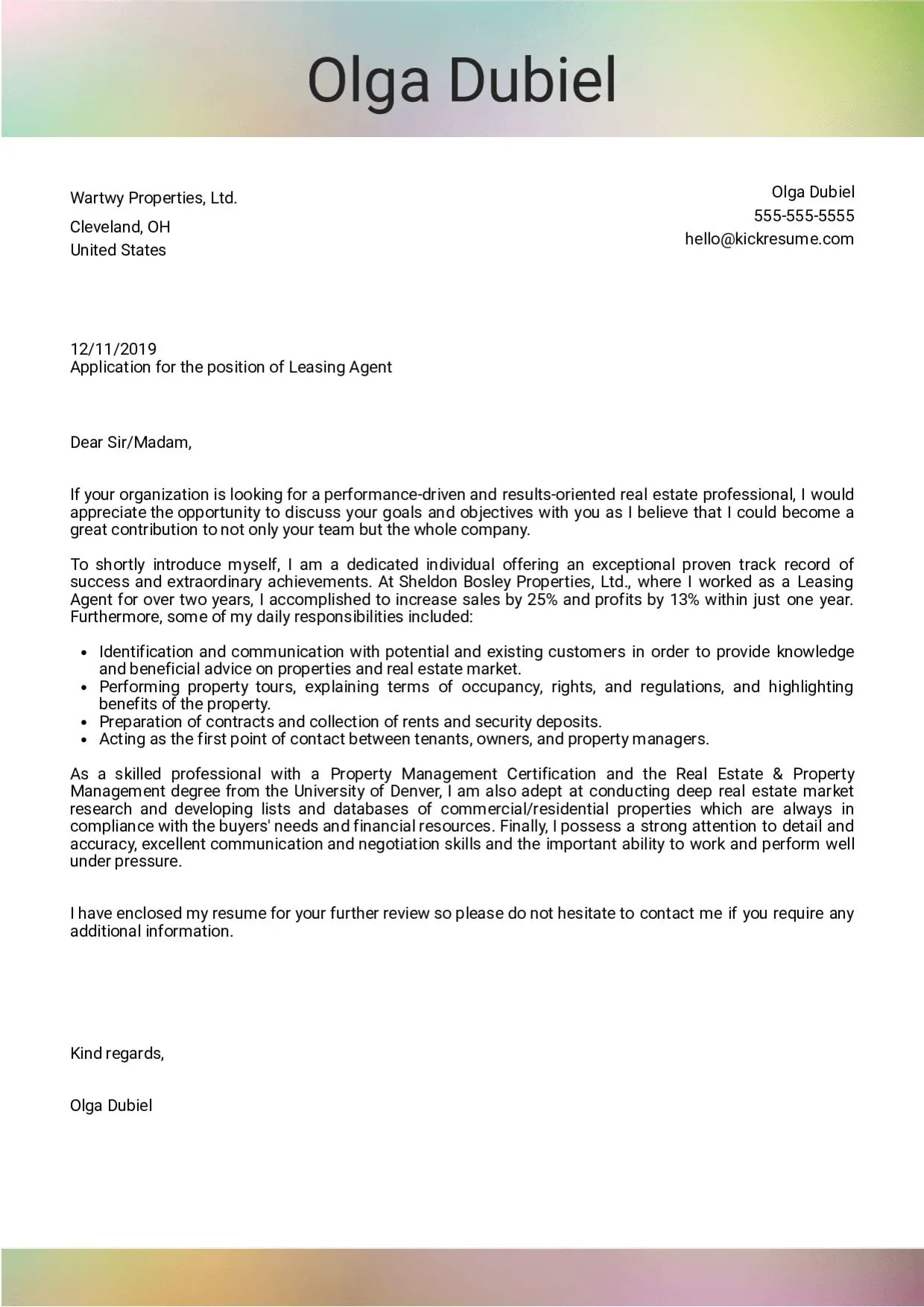
Express your enthusiasm for the agent and their agency. State your interest in working with them and the reasons why you think they would be a good fit. Show that you’ve researched their clients and are familiar with their work. Be genuine and avoid generic statements. Mention specific aspects of their work that appeal to you. This builds a connection and shows that you are invested in their agency. Your enthusiasm helps create a positive impression, demonstrating your passion for acting. It shows that you have done your research and understand their agency’s values and goals.
Closing Your Letter
End your letter with a professional closing statement. Reiterate your interest in the agent’s representation. Thank them for their time and consideration. State that you have attached your resume and headshot. Provide your contact information again for easy reference. Use a professional closing, such as “Sincerely” or “Best regards”. Avoid overly informal or casual closings. Make your closing clear, concise, and leave a positive impression.
Formatting and Presentation
Your cover letter must be well-formatted and easy to read. Use a professional font, such as Times New Roman or Arial. Maintain consistent margins and spacing throughout the letter. Keep the letter concise, ideally within one page. Proofread your letter for any grammatical errors or typos. Use a clear, uncluttered layout that is easy on the eyes. Use bullet points or short paragraphs to break up text. Ensure your letter is visually appealing and well-organized. This enhances readability and professionalism. The way you present your letter is just as important as its content.
Common Mistakes to Avoid
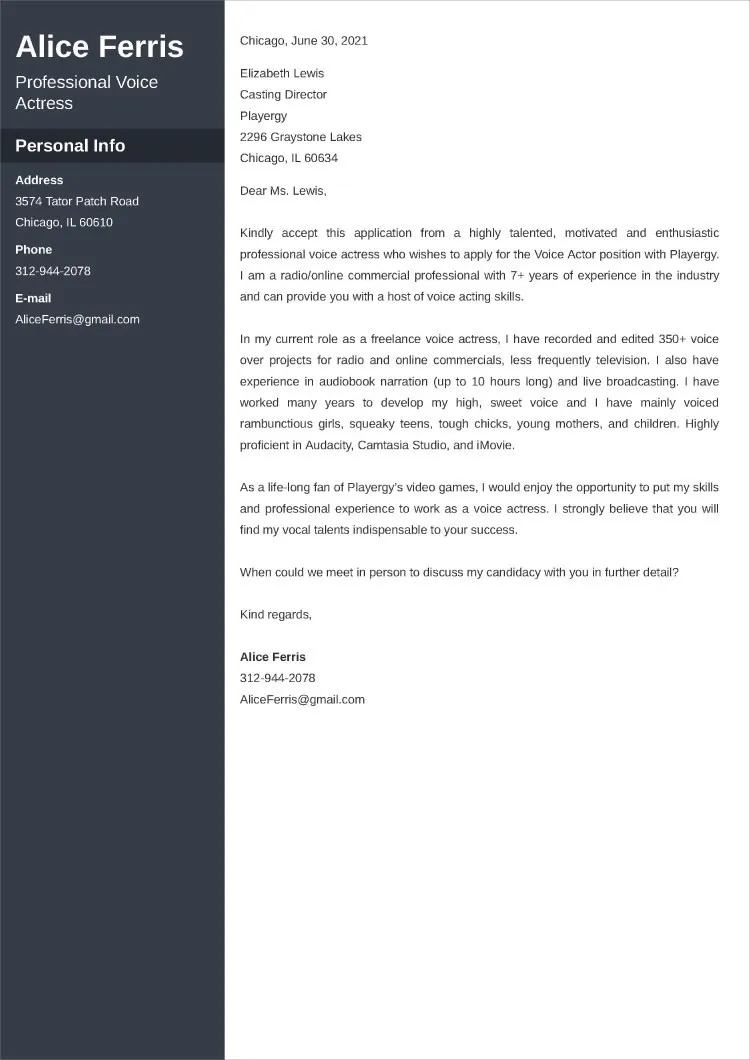
Avoid common mistakes that can undermine your cover letter. Do not use generic templates; customize your letter for each agent. Never include grammatical errors or typos. Do not be overly boastful or arrogant in your tone. Do not provide irrelevant information that doesn’t support your goal. Avoid sending the same cover letter to multiple agents. Ensure your letter stands out in a positive way. It shows that you have taken the time to personalize your application.
Proofreading Your Cover Letter
Proofread your cover letter meticulously before sending it. Check for grammatical errors, typos, and spelling mistakes. Ensure the formatting is consistent and professional. Have a friend or colleague review your letter for feedback. Pay close attention to the tone and clarity of your writing. Make sure your contact information is correct. A polished cover letter shows that you pay attention to detail. Thorough proofreading is a must to show professionalism.
Following Up After Submission
After submitting your cover letter, follow up with the agent if you have not heard back within a reasonable timeframe (usually two to three weeks). Send a brief, polite email to inquire about the status of your application. Reiterate your interest and enthusiasm. Avoid being overly persistent. Respect the agent’s time and professional obligations. If you receive a rejection, thank them for their time and keep them in mind for future opportunities. A well-timed and respectful follow-up shows your persistence. Maintain a positive and professional attitude throughout the process.
